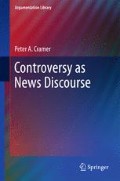Abstract
The narrated news event and the news reading situation are two key locations of controversy that are highlighted in the study of controversy as news discourse. In contrast to the direct dialogue of the classical speaking situation, the indirect dialogues of news discourse toggle attention between the narration of the journalist and the pragmatic interaction of the narrated interlocutors. If the classical speaking situation depicts an ideal pragmatic interaction, news discourse depicts a pragmatic engagement that is mediated by a reporting situation and situated in historical and social contexts. In narrated news events, controversy appears as a constituent of the these various levels of context. When approached with certain genres of reading, the formulas of news discourse help to position the reader and the text artifact in a larger public space in which controversy unfolds.
Access this chapter
Tax calculation will be finalised at checkout
Purchases are for personal use only
References
Agha, A. 2007. Language and social relations, Studies in the social and cultural foundations of language. Cambridge: Cambridge University Press.
Allport, F. 1924a. Social psychology. Boston: Houghton Mifflin.
Allport, F. 1924b. The group fallacy in relation to social science. American Journal of Sociology 29: 688–706.
Andrus, J. 2011. Beyond texts in context: Recontextualization and the co-production of texts and contexts in the legal discourse, excited utterance exception to hearsay. Discourse & Society 22(2): 115–136.
Bell, A. 1991. The language of news media. Cambridge: Blackwell.
Biber, D. 1988. Variation across speech and writing. Cambridge, UK/New York: Cambridge University Press.
Blair, J.A. 1998. The limits of the dialogue model of argument. Argumentation 12: 325–339.
Clark, C.D. 1933. The concept of the public. Southwestern Social Science Quarterly 13: 311–320.
Dewey, J. 1927. The public and its problems. New York: Henry Holt & Co.
Elliott, W. 1931. The possibility of a science of politics: With special attention to methods suggested by William B. Munro and George E.G. Catlin. In Methods in social science, a case book, 70–94. Chicago: The University of Chicago Press.
Eubank, E. 1927. The concepts of sociology. Social Forces 5: 386–400.
Hauser, G. 1999. Vernacular voices. Columbia: University of South Carolina Press.
Haviland, J.B. 1996. Text from talk in Tzotzil. In Natural histories of discourse, ed. M. Silverstein and G. Urban, 45–78. Chicago: University of Chicago Press.
Holcombe, A. 1925. National conference on the science of politics round table on political statistics: The measurement of public opinion. The American Political Science Review 18: 123–126.
Lippmann, W. 1925. The phantom public. New York: Harcourt Brace.
Lunberg, G.A. 1930. Public opinion from a behavioristic viewpoint. American Journal of Sociology 36: 387–405.
Macdowall, I., and Reuters Ltd. 1992. Reuters handbook for journalists. Oxford/Boston: Butterworth-Heinemann.
Plato, R.W. Sterling, and W.C. Scott. 1996. The republic. New York: Norton.
Schudson, M. 1978. Discovering the news: A social history of American newspapers. New York: Basic Books.
Silverstein, M. 1976. Shifters, linguistic categories, and cultural description. In Meaning in anthropology, 11–56. Albuquerque: University of New Mexico Press.
Silverstein, M. 1979. Language structure and linguistic ideology. In The elements: A parasession on linguistic units and levels, April 20–21, 1979: [proceedings], Conference on Non-Slavic Languages of the USSR, ed. P.R. Clyne, C.L. Hofbauer and W.F. Hanks, 193–247. Chicago: Chicago Linguistic Society.
Silverstein, M. 1993. Metapragmatic discourse and metapragmatic function. In Reflexive language: Reported speech and metapragmatics, 33–58. Cambridge: Cambridge University Press.
Silverstein, M. 1996. The secret life of texts. In Natural histories of discourse, ed. M. Silverstein and G. Urban, 81–105. Chicago: University of Chicago Press.
Tannen, D. 1986. Introducing constructed dialogue in Greek and American conversational narrative. In Direct and indirect speech, 311–332. New York: Mouton de Gruyter.
Urban, G. 1996. Entextualization, replication, power. In Natural histories of discourse, ed. M. Silverstein and G. Urban, 21–44. Chicago: University of Chicago Press.
Wichelns, H.A. 1966. Literary criticism of oratory. In The rhetorical idiom; essays in rhetoric, oratory, language, and drama, 5–42. New York: Russell & Russell.
Author information
Authors and Affiliations
Corresponding author
Rights and permissions
Copyright information
© 2011 Springer Science+Business Media B.V.
About this chapter
Cite this chapter
Cramer, P.A. (2011). Locations of Controversy. In: Controversy as News Discourse. Argumentation Library, vol 19. Springer, Dordrecht. https://doi.org/10.1007/978-94-007-1288-1_6
Download citation
DOI: https://doi.org/10.1007/978-94-007-1288-1_6
Published:
Publisher Name: Springer, Dordrecht
Print ISBN: 978-94-007-1287-4
Online ISBN: 978-94-007-1288-1
eBook Packages: Humanities, Social Sciences and LawPhilosophy and Religion (R0)

